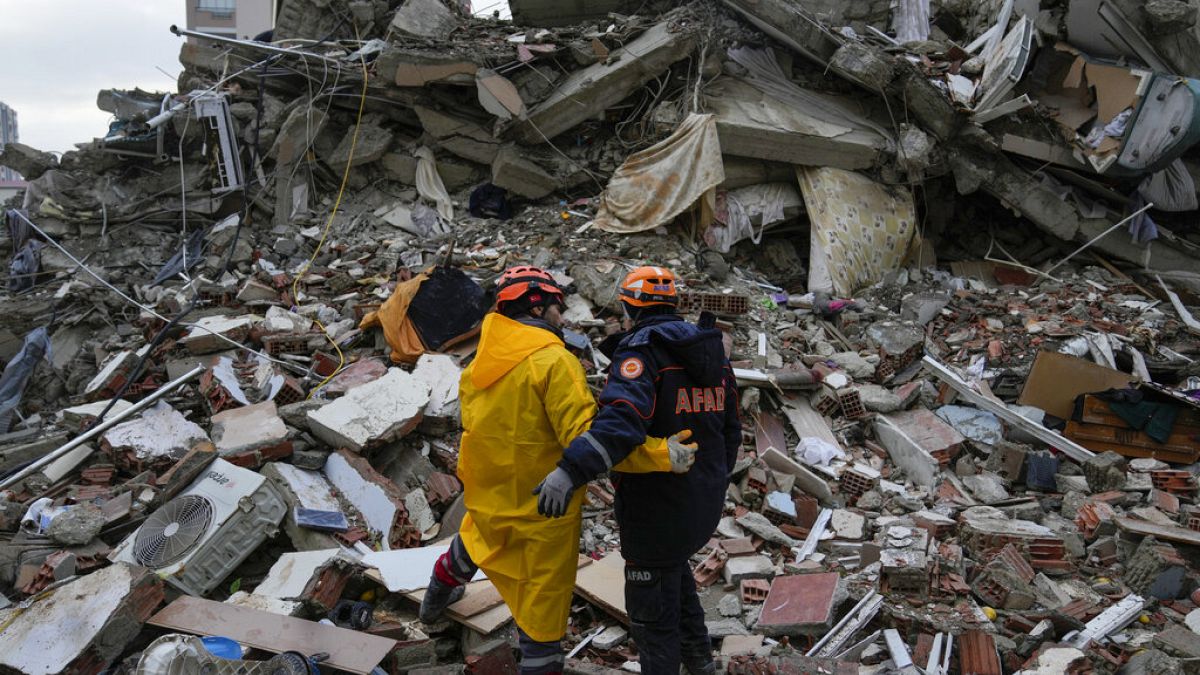First responders in Turkey and Syria are running against the time: How are international aid organisations coordinating to help the most vulnerable in the quickest time possible?
When it comes to rapid, emergency disaster relief, aid organisations play a crucial, life-saving role. But how do they mobilise on the ground and deliver vital help as quickly and effectively as possible? And how do they determine where the help is needed most urgently?
For Emma Forster, who works for the Norwegian Refugee Council (NRC) and has been in Damascus since September, an initial alert comes from the NRC's security team. Her first priority - a headcount. "Staff members are being contacted to find out if everyone is safe. A check is also made to see if the organisation's stock is safe and accounted for," she told Euronews.
Then, the situation on the ground is evaluated and important decisions are made about where aid is needed immediately and how to distribute it. "The whole process takes a few hours," Forster explains.
Next for Forster and her team are various offices (Forster calls them hubs) that are in close communication, already sending staff to the ground "to get an understanding of the most urgent needs."
Turkey and Syria - same needs, different response
In the case of the earthquake in Turkey and northern Syria, the priority was to send search teams. "Getting food, water and some kind of shelter to people is a top priority. And it's particularly difficult right now given that the country is currently facing a storm and it's pouring with rain."
Shortly after a natural disaster like this various organisations on the ground will start exchanging information through different channels. But ultimately its the UN Office for the Coordination of Humanitarian Affairs (OCHA) that is responsible for the coordination.
The involvement of the United Nations on a humanitarian basis in Syria is different to other countries in that it is accepted rather than requested by the government, explains Jens Laerke, Deputy Spokesperson of OCHA.
While Turkey already has a strong and capable natural disaster response authority, that is usually sent to help in natural disasters worldwide, the situation across the border is much more difficult. The "silver lining" in a country with an ongoing armed conflict he says, is that in the area there is already a robust UN-humanitarian network, like the NRC.
The NRC and other aid organisations are calling for more humanitarian assistance and more funding to support people in need now and in the coming weeks. Forster said it is important to make aid flexible, meaning allocating funds without restricting them to a specific sector, so that aid organisations can respond to needs accordingly.
How quickly does the EU help in the event of a natural disaster?
Turkey has not only asked for help from the OCHA, but it has also asked the EU for assistance within the framework of the EU Civil Protection mechanism. 15 search teams from 13 countries were dispatched only a few hours after the first quake. The EU Commission is in contact with the Turkish government and passes on the needs and demands to the member countries and will communicate back to Turkey what kind of help is available.
The coordination for search and rescue teams sent to Turkey is one of the major challenges right now, OCHA-Deputy Spokesperson Laerke explains. His office works in close consultation with Turkey's foreign affairs office: "We need to make sure the right people are in the right place".
Help that is not needed immediately will take up landing space or will need to be stocked and can actually slow down the run against the clock that has begun. As Laerke explains, search and rescue expect to have seven days to find survivors under the rubble.
"Syria did not trigger the EU Civil Protection mechanism," Balazs Ujvari, European Commission Spokesperson for Humanitarian Aid and Crisis Management, told Euronews.
Therefore no emergency aid has been dispatched to Syria so far. Through partner organisations, the Commission is being informed about the situation on the ground. However, the possibility of providing additional humanitarian funds for Syria is being examined.
Who pays for the first aid?
In this first response process, the EU commission is covering 75 per cent of the operational costs incurred by these operations. This has allowed the deployment of particularly well-equipped recovery teams to Turkey.
To provide further assistance to the Turkish government and to better understand the impact of the quake, the EU is providing images from the Copernicus system.
"All this will cost money", says Laerke predicting that the international community will soon have to provide funds for Syria and Turkey to enable the help of organisations like Forsters NRC.


